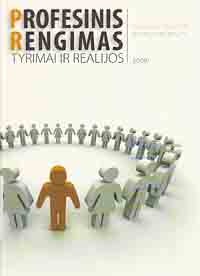Moterų , grįžusių į darbą po vaiko priežiūros atostogų, mokymosi poreikiai ir galimybės
Learning Needs and Possibilities of Women Who Return to Work after Maternity Leave
Author(s): Diana Tverskytė, Odeta NorkutėSubject(s): Education
Published by: Vytauto Didžiojo Universitetas
Keywords: mokymosi poreikiai; mokymosi galimybės; moteris; grįžusi į darbą po vaiko priežiūros atostogų; vaiko priežiūros atostogos; educational needs; educational capabilities; women who come back to work after maternity leave
Summary/Abstract: Galimybė moteriai auginti ir prižiūrėti vaiką iki 3 metų užtikrina vaiko ir motinos psichologinių ryšių tvirtumą, tačiau tuo pat metu dėl ilgos darbo pertraukos prarandama dalis profesinių įgūdžių. Į darbą grįžusių moterų prisitaikymas prie darbo režimo, naujų reikalavimų kelia naujus iššūkius neformaliojo švietimo sistemai, kurios įtaka žinių ir gebėjimų atnaujinimo srityje yra ypač reikšminga. Straipsnyje nagrinėjama problema, iškylanti moteriai, auginančiai vaikus ir po ilgo laikotarpio grįžusiai į darbą: dalis profesinių įgūdžių būna prarasta, o jiems susigrąžinti Lietuvoje nėra sukurto mechanizmo. Atlikto tyrimo rezultatai pagrindžia teiginį, kad moterys, po vaiko priežiūros atostogų grįžusios į darbą, turi stiprų profesinių žinių ir gebėjimų atnaujinimo poreikį, tačiau sąlygos šiam poreikiui patenkinti nėra pakankamai užtikrinamos. Šiuo metu egzistuojančios neformaliojo švietimo galimybės nėra nukreiptos į moterų, auginančių vaikus, profesinės kvalifikacijos atnaujinimo poreikius. A contemporary woman seeks acknowledgment in career and is an active player in society and politics at the same time being a wife and a mother. Combining all these roles is rather complicated. During the period of maternity leave a long break in career occurs since there is a possibility to raise a child until 3 years old; therefore, some professional skills are lost. In order to regain competitive ability in the labour market the previously acquired skills have to be renewed and qualification improved. As a result, the demand for training women who return to work after maternity leave is increased. It is important to investigate the needs for training such women and evaluate the existing training possibilities. In this study to identify the situation in Lithuania with regard to training and improving professional knowledge and skills of women who return to work after maternity leave such references were used: the research called “Family revolution? Challenges for family policy” carried out by Stankūnienė, Jonkarytė, Mikulionienė, Mitrikas and Maslauskaitė (2003), European Economic and Social Committee’s opinion on the gender pay gap (2008), Occupation strategies for the main groups of residents (2007) and strategies of Lisbon (2007). The assumptions, stating that a woman withdrawn from work for a long time due to child’s care loses a lot of previously acquired skills, and that conditions for renewing these skills are not sufficient, form the basis of the study together with the statements found in the research by Stankevičienė (1997) and Jančaitytė (2004), as well as in Public Conception of Family Policy (2008), stressing that in Lithuania the mechanism for regaining professional skills (infrastructure for training, network of preschool institutions) and encouraging to work and combine career and family has not been developed.
Journal: Profesinis rengimas: tyrimai ir realijos
- Issue Year: 2010
- Issue No: 19
- Page Range: 146-156
- Page Count: 11
- Language: Lithuanian

